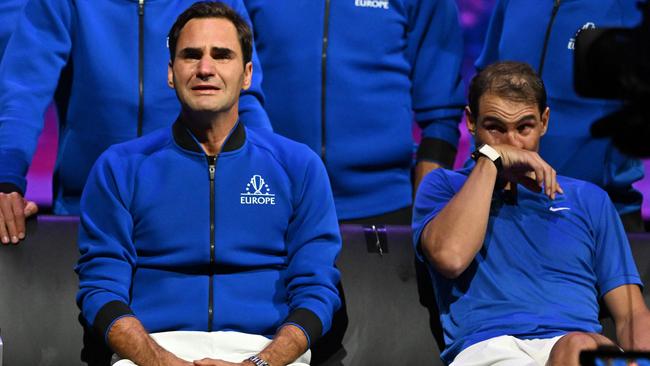
They were lined up on the deuce sides of the court. Millman’s offering was out wide. Federer was still on the blower, yes, Mirka, no, Mirka, it’s Millmania out here, darl, when he took a couple of steps to the right and spanked a flat and clean forehand winner. Phone was still between chin and shoulder. Millman dropped his racquet and laughed. Federer raised an eyebrow and giggled like he was a ball kid again at Basel. He ended his call, gotta go, darl, and won his 20th and final major at the 2018 Australian Open.
Retirement came four years later. Federer sat next to Rafael Nadal at the Laver Cup and held his mate’s hand, the big, beautiful, softie, while they had a good old cry at the realisation that nothing lasts forever. Ahead of Federer’s likely guest appearance at next month’s Wimbledon, Prime Video on June 20 will release a documentary, Federer: Twelve Final Days, detailing, well, the 12 final days of his poetic career.
Hold the phone, the doco is a ripper. Behind-the-scenes footage of Federer, Mirka and their four children is heartwarming. You suspect he’s one of the great goofball dads. Federer playing ping pong in a tuxedo is quite the sight. He cries. A lot. The tenderness and mateship between Federer and Nadal is even more sincere than I realised. I could fill this entire sports section with scenes and quotes but the boss gets cranky if I write more than 1500 words so we’ll keep it short and sweet. Here’s a few snapshots.
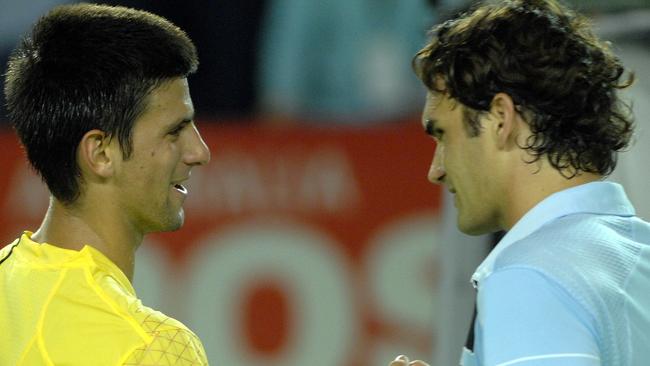
Federer on Novak Djokovic: “The first time I played him I thought, ‘Yeah, he’s okay.’ Even though there was some hype around him, I wasn’t really convinced. I think I didn’t give Novak the respect he deserved because of his technical flaws. I felt like Novak had a very extreme forehand grip and his backhand, for me, wasn’t as fluid as it is nowadays. But then he ironed those things out super-well and he became an unbelievable monster of a player.”
He says: “Novak, I guess he was the party-crasher for Roger-Rafa fans. There was a lot of Roger-Rafa love. So when Novak came, probably a lot of people were like, ‘We don’t need a third guy. We’re happy with Roger and Rafa.’ Federer fans, in the beginning, didn’t really like him because they thought, ‘Well, Roger’s a bit more easy, he does it with ease.’ Then Novak came along with his strong personality and that unbelievable grit and will to win at all costs. I know this was something I was criticised heavily a lot for. Why wouldn’t I fight more when losing?”
He adds: “I didn’t quite understand what that meant. Do I have to grunt more? Do I have to sweat more? Do I have to shout more? Do I have to be more aggressive towards my opponents? What is it? I tried to do that, but it was all an act. I’m not like that. It’s not my personality.”
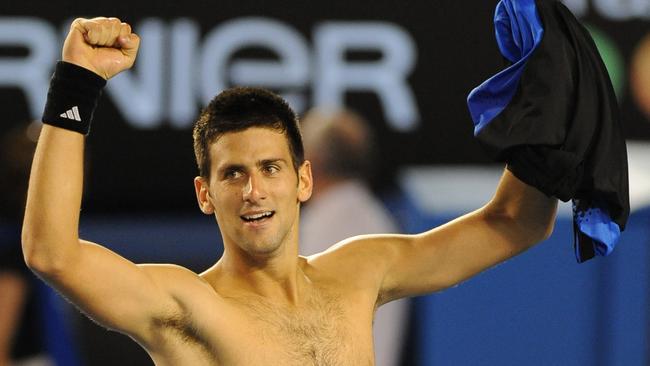
Footage is shown of a chest-thumping, shirt-ripping, crowd-taunting Djokovic as Federer says: “For some other players, it’s maybe easier to have that. It’s maybe ingrained in their DNA. I think Novak was also triggered by the relationship with the fans.
“I think his deep focus maybe scared some people away … but I think he’s been a little bit misunderstood. I look past the media and I see at the end, the man he is. If I take away his game, who is he? What are his values? I can feel he cares very deeply about his family, so we have similar values.”
When Federer greets Djokovic before the Laver Cup, he says, “Nice to see you, brother.” There’s a cool but distant respect – until after Federer’s final match. Surprisingly, Djokovic is weeping in the locker room after a private conversation with Federer, who says: “Novak, I told him things at the very end that were very personal. That maybe triggered something with him.”
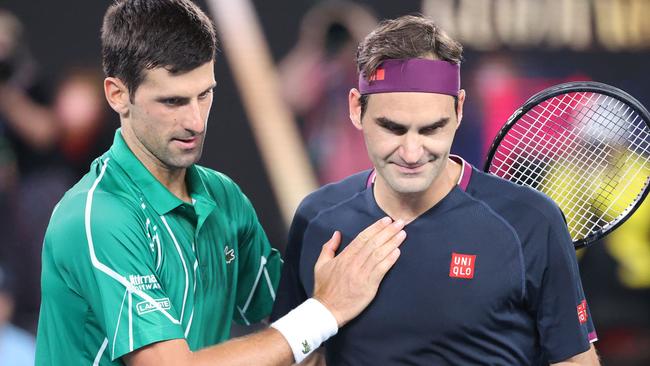
The most emotional triggering is between Federer and Nadal. Ten days before publicly announcing his retirement, he called his Spanish mate. “In a 50-minute conversation he explained everything,” Nadal says.
“I had tears on my eyes … When you see somebody who’s been a very important part of my life decide to retire, it’s a tough moment … lots of emotions. Lots of memories. The feeling before a grand slam final against Roger – it’s different. A different atmosphere. Different kind of pressure. To know I will not have this feeling again for the rest of my life is something that is painful. Even if we have a great rivalry on the court, we were able to have a very good friendship outside and I think that is something very difficult to find in this very competitive world.”
Not for the first time, and not for the last, Federer cries. A lot. He listens to Nadal’s remarks and says: “I can feel that, too. It’s very unique. Definitely special. I’m happy we made it to the end. I think the world can be a bit puzzled sometimes how we can be good friends. I think it’s possible to play it tough and fair and yet on the side be friendly.
“When he hit the tour, you could feel there was something special there. He was going to win slams. We knew it.”
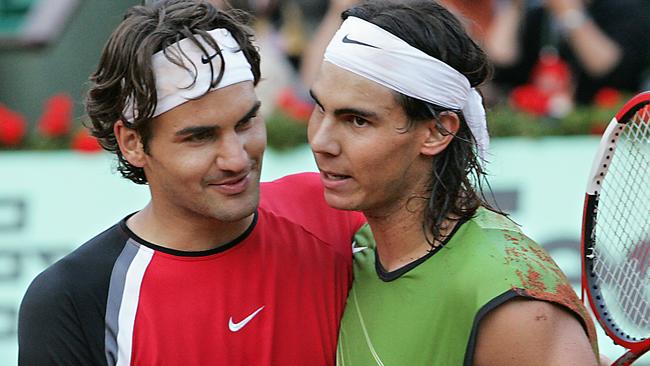
Federer says: “I remember Rafa as a young boy being very shy. He struggled to give you eye contact and all that. I lost my first match against him and in the first instance I was like, ‘I don’t want to have this guy here. I like being at the top. Alone. So I had to really find a way to dig deeper into myself and say, ‘Okay, how am I going to deal with this now?’ Because it was a bit of a mind-bender. I just couldn’t quite figure him out or unlock him.”
Nadal says: “In this world, it is easier to improve when you have positive examples in front. I had this in Roger. I miss him on the tour and for the rest of the time I am going to be on the tour, I will miss him. I always thought I was going to be the first to leave because of all the problems I have had in terms of injuries.
“I am sad about what has happened. He wanted so bad to be back. It was not possible but on the other hand, his legacy is going to stay in the world of sport forever. We are never going to see a player with that flow and that elegance. Ever.”
Federer on tennis: “As it’s not a contact sport, it’s a very interesting sport as we almost touch each other through the tennis ball. We can feel the force of the opponent with the ball’s spin or power. How much he grunts on the shot, that’s a message as well. And then it’s very much like a chess match. You start anticipating and predicting what’s going to happen. You get your favourite patterns. So does your opponent, so it’s always a battle of who gets the pattern his way.
“I would take a lot of joy at trying to beat the opponent at his game. If he liked to play long rallies I’d say, ‘Okay, let’s do long rallies and I’ll beat you at that and then you have nothing else.’ If he came to the net a lot I’d say, ‘Okay, I’ll also come to the net and I’ll beat you at that, too. It’s a very psychological chess match but in a physical version.”
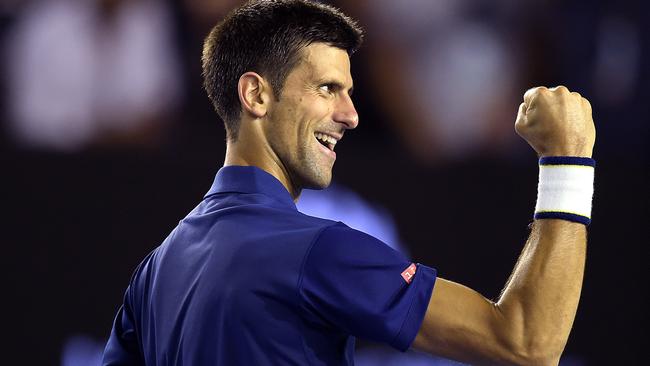
Federer, aged 41, held his phone and announced his retirement by publishing a social media message that finished, “To the game of tennis, I love you and will never leave you.” The beginning of the end had been the knee injury he sustained in Melbourne in 2016.
“I lose to Novak in the semis of the Aussie Open,” Federer says. “I wake up the next morning and the kids went to the pool at the hotel. I was like, ‘Okay, let’s go take a shower and then we’ll go to the zoo.’ The girls are like, ‘No, we want to take a bath.’ I’m like, ‘No, it’s shower time.’ They’re like, ‘No, it’s bath time.’ I’m like, ‘Fine, it’s bath time. You win.’ So I go to the bath tub. As I switch on the water, my knee goes click. I’m like, ‘Oh my God.’
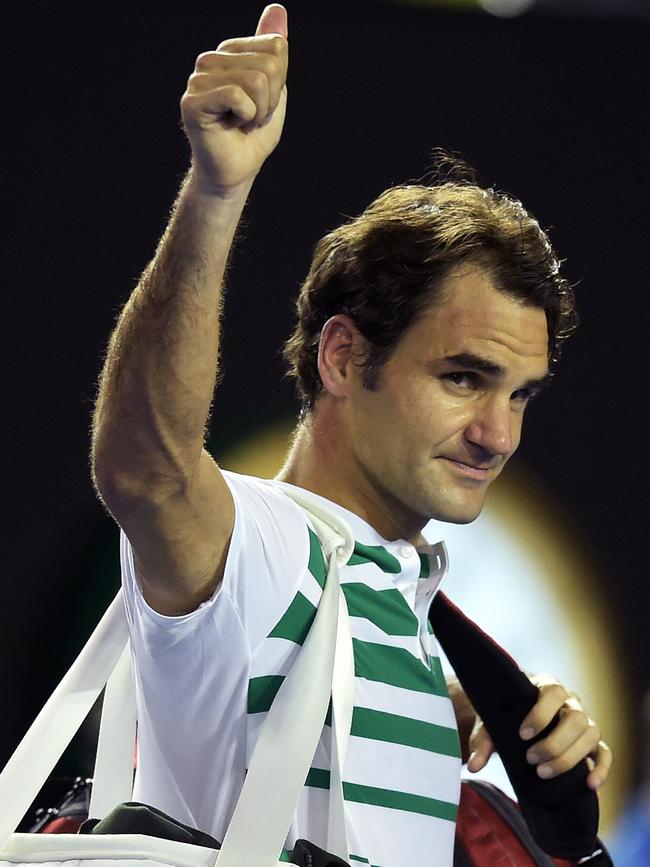
From that moment on, my knee was never the same.”
He says goodbye by earnestly saying: “I will miss this. I will miss the game of tennis. I guess we could almost call it a bit of grieving, you know? It’s always been a great life school to me. I’ve always been really thankful for everything it has taught me but as professional athletes, we all know we’re on borrowed time. It can be hard to deal with that, you know?”


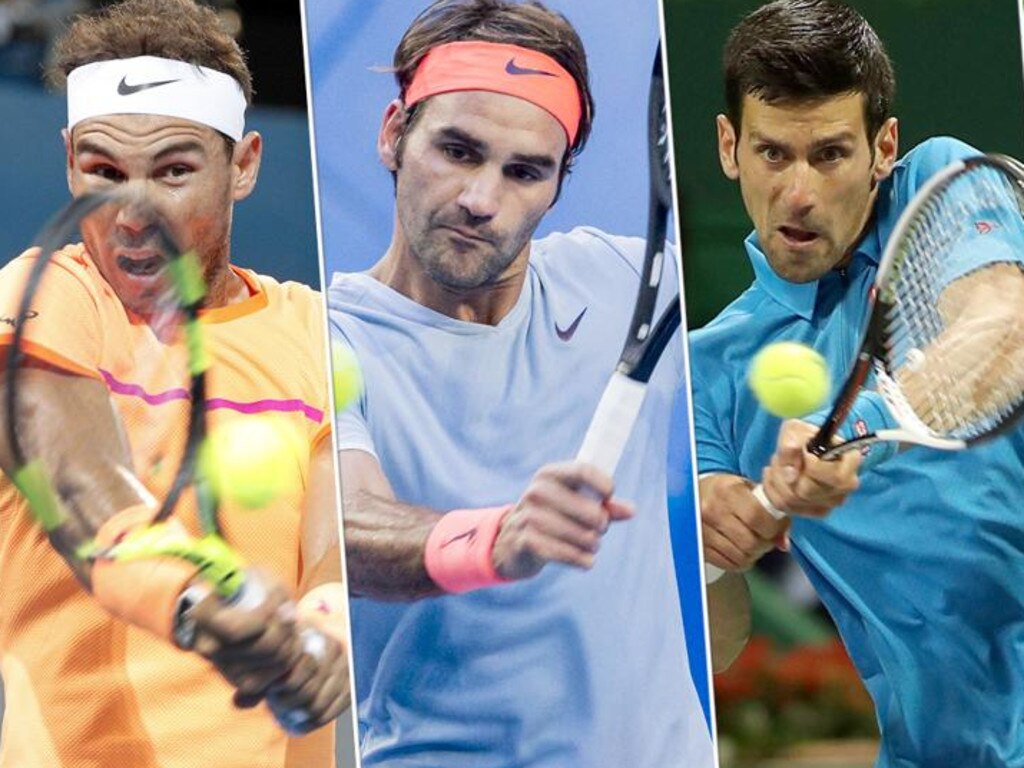

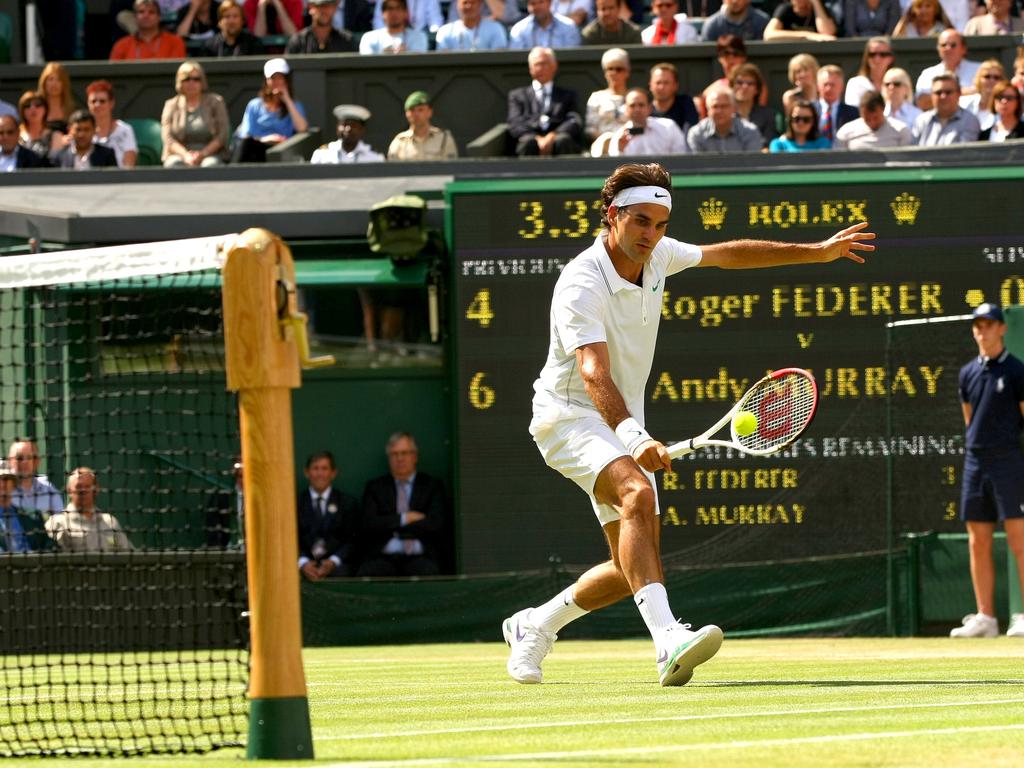

The best shot I ever saw Roger Federer hit was at Melbourne Park. He was training with John Millman when his phone rang. Must have been important because he took the call. Probably Mirka. He tucked the phone between his clean-shaved chin and left shoulder as Millman went thwock with a serve.